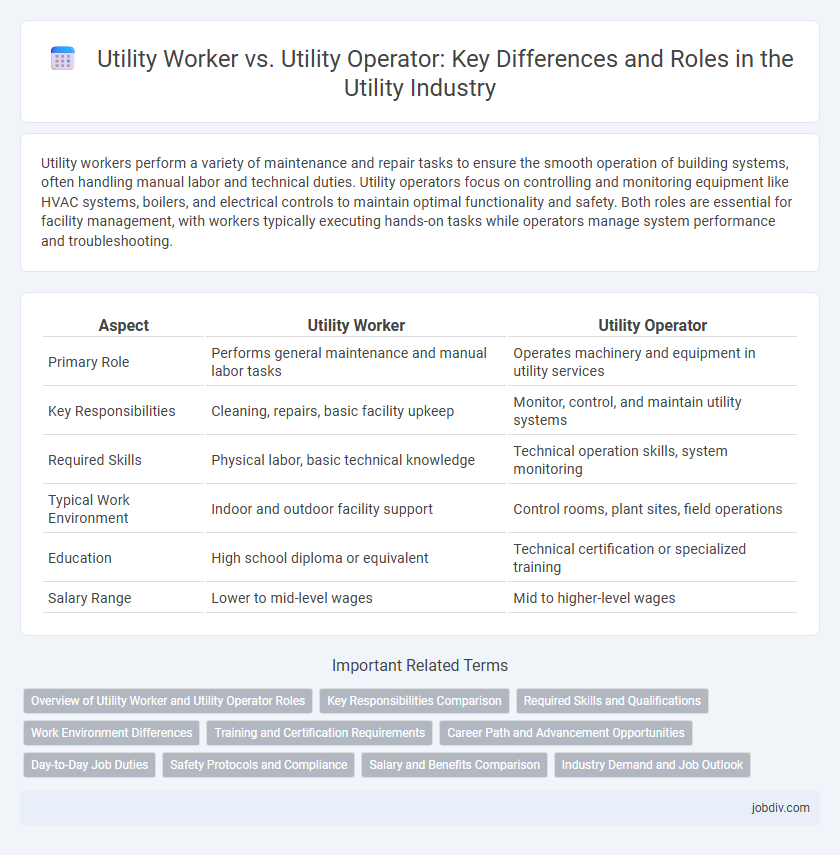Utility workers perform a variety of maintenance and repair tasks to ensure the smooth operation of building systems, often handling manual labor and technical duties. Utility operators focus on controlling and monitoring equipment like HVAC systems, boilers, and electrical controls to maintain optimal functionality and safety. Both roles are essential for facility management, with workers typically executing hands-on tasks while operators manage system performance and troubleshooting.
Table of Comparison
| Aspect | Utility Worker | Utility Operator |
|---|---|---|
| Primary Role | Performs general maintenance and manual labor tasks | Operates machinery and equipment in utility services |
| Key Responsibilities | Cleaning, repairs, basic facility upkeep | Monitor, control, and maintain utility systems |
| Required Skills | Physical labor, basic technical knowledge | Technical operation skills, system monitoring |
| Typical Work Environment | Indoor and outdoor facility support | Control rooms, plant sites, field operations |
| Education | High school diploma or equivalent | Technical certification or specialized training |
| Salary Range | Lower to mid-level wages | Mid to higher-level wages |
Overview of Utility Worker and Utility Operator Roles
Utility workers perform essential maintenance and repair tasks on infrastructure such as water, gas, and electrical systems, ensuring continuous service delivery. Utility operators are responsible for operating and monitoring equipment and control systems to regulate utility flows and maintain safety standards. Both roles require technical skills but differ in operational focus, with workers emphasizing fieldwork and operators specializing in system management.
Key Responsibilities Comparison
Utility Workers primarily handle manual labor tasks such as installation, maintenance, and repair of utility infrastructure including water, gas, and electrical systems, supporting daily operational needs. Utility Operators manage and control the operation of utility equipment and systems, monitoring performance, troubleshooting issues, and ensuring compliance with safety and environmental regulations. The key distinction lies in Utility Workers focusing on physical labor and fieldwork, while Utility Operators concentrate on system supervision and operational control.
Required Skills and Qualifications
Utility Workers typically require basic technical skills, physical stamina, and a high school diploma or equivalent, with on-the-job training emphasizing safety protocols and equipment handling. Utility Operators need more advanced qualifications including certifications or licenses to operate heavy machinery, strong problem-solving abilities, and knowledge of utility systems such as water, gas, or electrical networks. Both roles demand attention to detail and adherence to regulatory compliance, but operators must also demonstrate proficiency in monitoring system performance and conducting preventative maintenance.
Work Environment Differences
Utility workers typically perform general maintenance and repair tasks across varied outdoor and indoor settings, often facing physically demanding conditions such as adverse weather and uneven terrain. Utility operators usually work in controlled environments, such as power plants or treatment facilities, where they monitor and control complex machinery with a focus on safety protocols and precision. The work environment for utility workers is more mobile and labor-intensive, while utility operators experience a more stationary, technical workspace centered around equipment operation.
Training and Certification Requirements
Utility workers typically require entry-level training and may need certifications such as OSHA safety courses, while utility operators often undergo more specialized training in equipment operation and system controls. Certification for utility operators frequently includes state or industry-specific licenses to handle complex machinery and regulatory compliance. Both roles emphasize safety training, but operators usually need advanced technical certifications reflecting their responsibility for system functionality and maintenance.
Career Path and Advancement Opportunities
Utility workers typically begin their careers performing manual and entry-level tasks such as system inspections, maintenance, and repairs, gaining foundational experience essential for progression. Utility operators advance by developing specialized skills in operating, controlling, and monitoring complex utility systems, often requiring certification and technical training. Career paths for utility operators frequently lead to supervisory or technical specialist roles, offering higher responsibility and improved salary prospects compared to utility workers.
Day-to-Day Job Duties
Utility workers perform essential maintenance tasks such as repairing pipelines, inspecting electrical systems, and clearing debris to ensure utility infrastructure functions smoothly. Utility operators control and monitor systems like water treatment plants, power grids, or gas distribution networks, using specialized equipment to maintain consistent service and respond to system alerts. Both roles require adherence to safety protocols and coordination with technical teams to minimize service disruptions.
Safety Protocols and Compliance
Utility Workers and Utility Operators adhere to strict safety protocols designed to minimize risks in hazardous environments, including the use of personal protective equipment (PPE) and adherence to OSHA standards. Utility Operators often follow more complex compliance requirements due to their responsibility for managing and controlling utility systems, necessitating specialized training in regulatory procedures. Both roles are critical in maintaining workplace safety and ensuring compliance with federal and state safety regulations to prevent accidents and operational disruptions.
Salary and Benefits Comparison
Utility workers typically earn an average salary ranging from $30,000 to $45,000 annually, while utility operators often secure higher pay between $40,000 and $60,000, reflecting greater technical responsibilities. Benefits for both roles generally include health insurance, retirement plans, and paid time off, but utility operators may receive enhanced bonuses or overtime opportunities linked to their skill level. Career advancement potential and specialized certifications contribute significantly to the salary and benefits gap between utility workers and operators.
Industry Demand and Job Outlook
The demand for utility workers remains strong in sectors such as energy, water, and telecommunications due to ongoing infrastructure maintenance and expansion projects. Utility operators are increasingly sought after for their specialized skills in controlling and monitoring automated systems, resulting in a favorable job outlook with steady employment growth projected by the U.S. Bureau of Labor Statistics. Both roles offer essential contributions to utility services, but utility operators tend to experience higher demand in technologically advanced facilities.
Utility Worker vs Utility Operator Infographic

 jobdiv.com
jobdiv.com